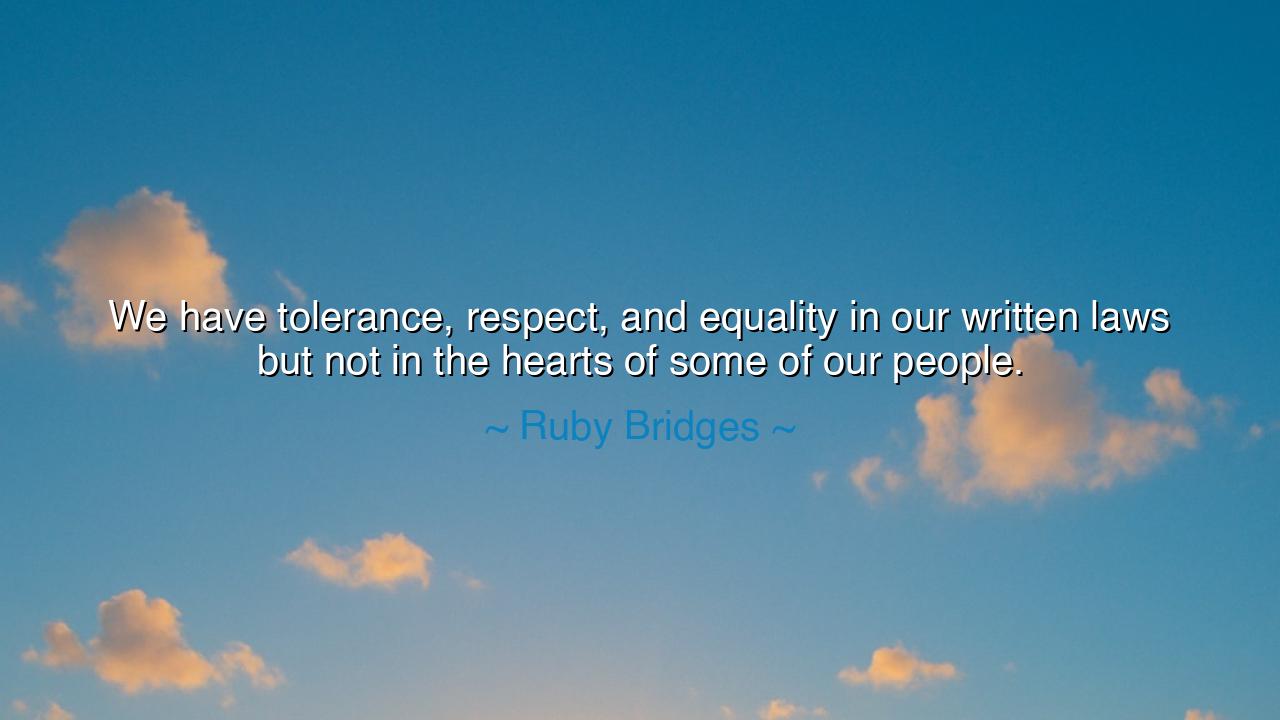
We have tolerance, respect, and equality in our written laws but
We have tolerance, respect, and equality in our written laws but not in the hearts of some of our people.






In the unfolding narrative of human progress, where the flames of justice and equality flicker and sometimes burn bright, there is a haunting truth, one that rings in the words of Ruby Bridges: "We have tolerance, respect, and equality in our written laws but not in the hearts of some of our people." These words, born of a lifetime lived in the shadow of injustice, challenge us to look beyond the formalities of legislation and into the true soul of our society. For while the laws may tell us that all are equal, the hearts of some still hold tightly to the chains of prejudice and hate—chains that no law, no matter how well-written, can break without the transformation of the human heart.
At the heart of Bridges' statement is a truth that has echoed throughout the ages: the spirit of equality cannot be mandated solely through the written word. True equality must be birthed from the heart, for it is there that the deepest, most enduring change occurs. The ancient Greeks, with all their wisdom, understood that laws are not enough to shape a just society. In their society, Athens was the birthplace of democracy, yet even in this cradle of progress, the ideals of equality and freedom were marred by the exclusion of slaves, women, and non-citizens. The laws may have spoken of democracy, but the heart of Athens was not yet ready to embrace all its people with full respect and equality. And so it was that, even with the best of intentions, society struggled to turn laws into truth.
The story of Ruby Bridges is a modern parable that brings this ancient truth into sharp relief. At just six years old, she became a symbol of courage when she integrated an all-white school in New Orleans in 1960. As she walked through the crowds of hostility and hatred, escorted by federal marshals, she faced the full weight of a society that claimed to uphold the values of equality and respect, yet could not live them out in its hearts. Her bravery was not simply in attending that school but in the knowledge that she was challenging the very heart of a nation that had written equality into law but had yet to make it real in the lives of its people. In her courage, we see the stark contrast between the ideals on paper and the deep-seated fears and hatreds that festered in the hearts of some.
In the ancient world, the Exodus of the Israelites from Egypt presents another striking example of the tension between law and heart. While the Israelites were freed from the shackles of slavery through divine intervention, the journey to the Promised Land was not just a physical one; it was a journey of transformation. The people had to learn not just to follow the laws given to them but to internalize the values of freedom, justice, and brotherhood that the laws represented. Even after being freed, their hearts remained bound by the memories of oppression, and they had to be purified in the wilderness before they could truly inherit the land of equality. Law, like the commandments, could show them the way, but only by changing their hearts could they become the people they were destined to be.
This duality between law and heart is central to the lesson Bridges imparts to us. Laws may declare us equal, but without a true transformation of the heart, these laws are empty. As Dr. Martin Luther King Jr. said, "It is not the laws of man but the laws of God that will guide us toward true justice." This idea echoes through the ages, reminding us that freedom and equality cannot exist where the heart is unyielding and closed to the humanity of others. Laws alone cannot heal the divisions of race, class, or gender; it is the hearts of people that must undergo the revolution, turning from fear, hatred, and ignorance to love, respect, and understanding.
The lesson we must carry forward is one of self-reflection and action. As Bridges and countless others have shown, true equality does not come from simply passing laws—it comes from the slow, patient work of changing hearts. We must strive not only to demand justice in the laws of the land but to nurture compassion, understanding, and tolerance in our everyday lives. We must challenge ourselves to break down the walls of fear and hatred within our hearts and to embrace the diversity of humanity with love and respect.
In our lives, we are called not to wait for society to change on its own, but to be the agents of change in our communities. Whether it be through small acts of kindness or standing up against injustice, we must embody the equality and respect we wish to see in the world. Let us be like Ruby Bridges, who faced hatred with a heart full of bravery, and let us work to ensure that the laws of equality are reflected in the hearts of those around us. Only then will the ideals of liberty, justice, and equality become the living truth of our society, not just words written on paper.






AAdministratorAdministrator
Welcome, honored guests. Please leave a comment, we will respond soon